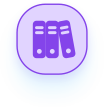









Predictive analytics: Data science can be used to predict the likelihood of developing a disease, based on factors such as age, gender, lifestyle, and family history. This information can be used to develop personalized prevention strategies and to identify individuals who may benefit from early screening.
Precision medicine: Data science is helping to make medicine more personalized by tailoring treatments to each individual's unique genetic profile, lifestyle, and environment. This approach has the potential to improve treatment outcomes and reduce side effects.
New drug discovery: Data science is being used to identify new targets for drug development and to develop more effective and safer drugs. This process is often faster and more efficient than traditional methods.
Remote patient monitoring: Data science is enabling the development of new devices and technologies that can remotely monitor patients' health. This information can be used to track progress, identify potential problems, and prevent complications.
Improved patient engagement: Data science can be used to create personalized health information and recommendations that are tailored to each individual's needs and preferences. This helps to improve patient engagement and empowers individuals to take control of their health.
Data science is still a relatively new field, but it has the potential to revolutionize healthcare. As the amount of data available continues to grow, data science will become an increasingly important tool for improving the health of individuals and populations around the world.